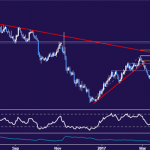Tim Duy, who is a cool economist, points out a difference between the labor market and output GDP… Labor market improving while GDP is slowing. He describes this difference for the Fed.
“Now they have slow GDP growth and fast employment growth. That will make brains explode on Constitution Ave.”
Yet, Brains need not explode. I have had a model of this difference for a couple of years, which predicted perfectly this situation. Yet, my model ultimately shows that the business cycle has ended, which is something economists like Duy and others at the Fed may not accept.
The Cobra Equation
The driving force behind an effective demand limit is the aggregate profit rate. When companies have increasing profit rates, it is more difficult to have a recession. We have seen in the past year that the aggregate profit rate is falling. This is not a good time to be raising interest rates. It would have been better a few years ago. Anyway…
I gauge aggregate profit rates in 3-dimensional space with what I call the Cobra equation, because it resembles a cobra in 3-D space…
Profit rate = (U + C) – a*(U2 * C2)
U = (1 – unemployment rate)
C = Capacity utilization
a = effective labor share2 – 2.475 * effective labor share + 2
When I take the derivative of the equation, I can gauge the potential change of the aggregate profit rates. I can take the derivative with respect to C and U.
d profit rate/dC = (1 – 2aCU2)
d profit rate/dU = (1 – 2aUC2)
They look the same but in reality they take different paths. Here are the derivatives up to December 2015.

Basically the graph shows that the utilization of capital reached its max profitability towards the end of 2014, when the red line reached zero %. Businesses have squeezed all they can from capital in the aggregate. For capital, the business cycle is over. But hiring labor is still profitable, so as the business cycle hangs on, we will see improvements in the labor market.














Leave A Comment